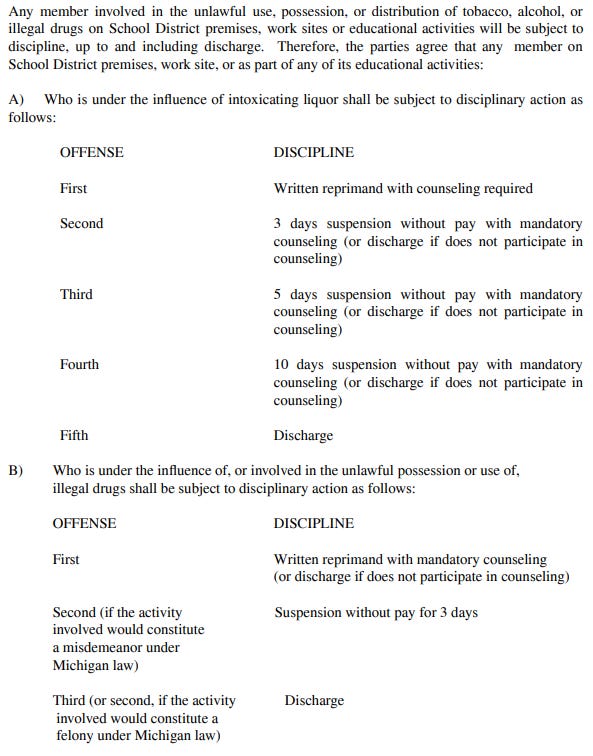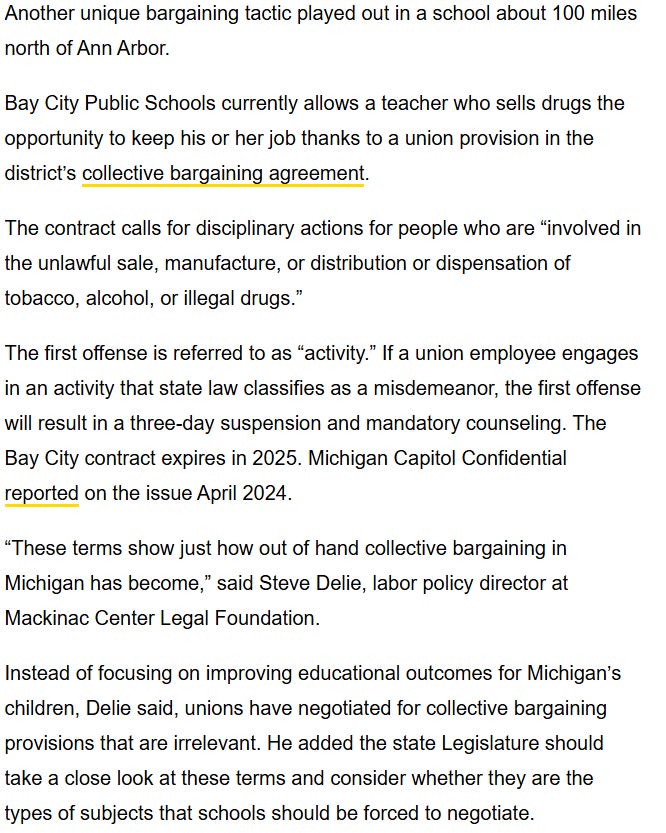The Mackinac Center for Public Policy recently highlighted a union contract by the in Michigan's Bay City Public Schools has sparked outrage over its disciplinary provisions for teachers involved in illegal activities, including drug and alcohol offenses. Critics argue that the contract exemplifies the excessive power of teachers' unions, shielding educators from termination even in serious cases of misconduct.
According to the collective bargaining agreement, a teacher who is found manufacturing, selling, or distributing illegal drugs on school property can face as little as a three-day unpaid suspension paired with mandatory counseling. The policy applies to other offenses as well, including being under the influence of drugs or alcohol during school activities.
Please support my independent journalism. I left the mainstream media to bring you these stories. I can’t do it without you. It’s$6 a month, you can quit at anytime. Help me, to keep them honest.
Alcohol Offenses: Five Chances Before Termination
The contract specifies a progressive disciplinary system for alcohol-related misconduct. A teacher under the influence of alcohol at school receives the following penalties:
First offense: Written reprimand and mandatory counseling.
Second offense: Three-day unpaid suspension with mandatory counseling.
Third offense: Five-day unpaid suspension with mandatory counseling.
Fourth offense: Ten-day unpaid suspension with mandatory counseling.
Fifth offense: Termination.

This provision has raised concerns among parents and critics who question whether it adequately prioritizes student safety and the integrity of the educational environment.
Please SHARE this with your friends. The mainstream media won’t report this.
Drug Offenses: Three Strikes for Illegal Substances
The disciplinary system for drug-related offenses is similarly lenient:
First offense: Written reprimand with mandatory counseling.
Second offense (if classified as a misdemeanor under state law): Three-day unpaid suspension with mandatory counseling.
Third offense (or second, if classified as a felony): Termination.
Even more contentious is the contract’s handling of teachers who engage in the sale or manufacture of illegal drugs. The first offense in such cases is treated similarly to lesser infractions, with a three-day unpaid suspension and mandatory counseling.

Broader Implications and Criticism
Steve Delie, a labor policy director at the Mackinac Center Legal Foundation, criticized the contract, calling it an example of "how out of hand collective bargaining in Michigan has become."
“Instead of focusing on improving educational outcomes for Michigan’s children, unions have negotiated for collective bargaining provisions that are irrelevant," Delie said. "The state Legislature should take a close look at these terms and consider whether these are the types of subjects that schools should be forced to negotiate.”
Public Reaction
Parents and local community members have expressed outrage over the leniency of the disciplinary measures, arguing that such policies undermine trust in the education system. Many have called for stricter regulations to ensure that schools maintain a safe and productive environment for students.
As debate continues, the controversy over Bay City Public Schools’ union contract underscores the broader discussion on the role and power of teachers' unions in shaping education policy.




















